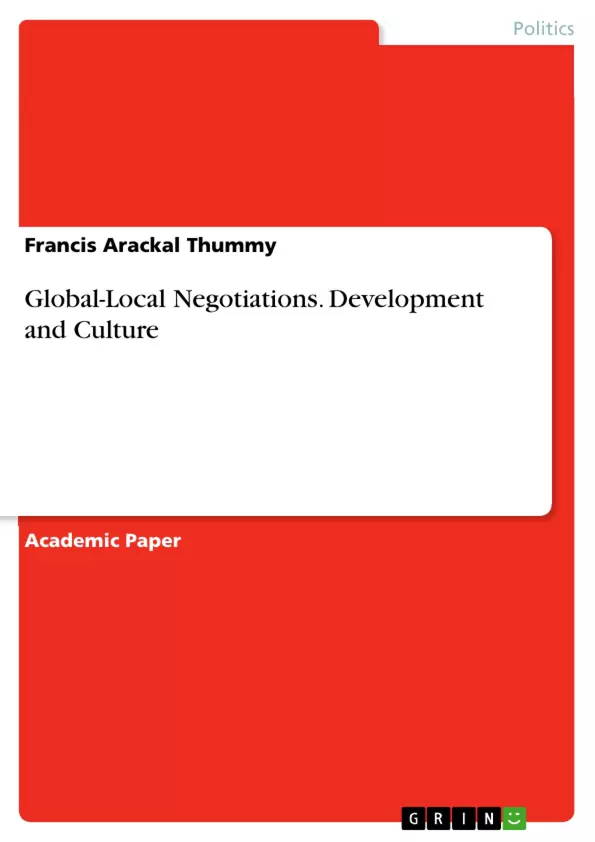Development has to be understood holistically. It is very closely connected to culture, which is very difficult to define. Cultural factors have powerfully affected the pace of development. This paper begins with the status of culture in the international development paradigm. Then the author will examine the relationship between culture and sustainable development, going on to reflect the importance of culture in environmental sustainability.
Next, the paper will discuss the role of culture for peace and reconciliation, for only when there is peace there can be proper development. In the last part of his paper, the author looks at the relationship between media culture and development. In the media mediated society, which we live in today, culture is influenced by the media resulting in what is called ‘media-culture’, which leads to a unique kind of development.
The recognition that development programmes and strategies at the global, regional and local levels should integrate culture within their goals, indicators and targets is still not as widespread as it should be. Without such a globally agreed and shared recognition, the potential of culture to contribute to sustainable development risks being largely untapped. Giving due consideration to specific settings (a stronger concern for local cultural perspectives) in which the development processes should be conceived and implemented, is paramount.
Inhaltsverzeichnis (Table of Contents)
- Development and Culture: Global-Local Negotiations
- Introduction
- Relationship between Development and Culture
- The Role of Culture in Development
- Culture in the International Development Paradigm
- Culture and Sustainable Development
Zielsetzung und Themenschwerpunkte (Objectives and Key Themes)
This paper explores the intricate relationship between development and culture in the context of globalization, arguing that development processes and their impact on societies can only be fully understood by considering cultural factors. The paper examines the historical and contemporary perspectives on development and culture, highlighting the influence of cultural factors on the pace of development and the importance of integrating culture into development strategies.
- The interconnection between development and culture in the era of globalization
- The significance of cultural factors in shaping development trajectories
- The role of culture in achieving sustainable development and environmental sustainability
- The importance of culture for peace and reconciliation in fostering development
- The interplay between culture and the media, leading to the emergence of "media-culture" and its impact on development
Zusammenfassung der Kapitel (Chapter Summaries)
- Introduction: This chapter introduces the concepts of development and culture, arguing that they are interconnected and that a holistic understanding of development requires considering cultural aspects beyond economic indicators. The chapter also critiques traditional development models based on economic growth and emphasizes the importance of a more comprehensive approach that incorporates social, cultural, and spiritual dimensions.
- Relationship between Development and Culture: This chapter delves into the various cultural factors that influence development, including religion, history, language, traditions, values, artistic expressions, and political and economic norms. It explores how these factors can both promote and hinder development, providing examples from various societies.
- The Role of Culture in Development: This chapter examines the significance of culture within the international development paradigm, discussing how cultural considerations have gained increasing importance in recent years. It highlights the UN's recognition of culture's role in sustainable development and the importance of a culture-sensitive approach to development initiatives.
- Culture in the International Development Paradigm: This chapter discusses the growing recognition of culture's role in development within international policy documents and institutions. It explores how the international community has shifted towards recognizing the limitations of traditional development models and the need for a more culture-sensitive approach.
- Culture and Sustainable Development: This chapter delves into the interconnectedness between culture and sustainable development, arguing that culture is central to achieving environmentally and socially sustainable development. It emphasizes the importance of integrating cultural values and practices into development strategies to ensure long-term sustainability.
Schlüsselwörter (Keywords)
The main keywords and focus topics of this text include development, culture, media, globalization, sustainability, and peace. The paper explores the interconnectedness of these concepts, examining how culture shapes development processes and the role of culture in achieving sustainable development, peace, and social well-being in the globalized world.
- Quote paper
- Prof. Francis Arackal Thummy (Author), 2013, Global-Local Negotiations. Development and Culture, Munich, GRIN Verlag, https://www.hausarbeiten.de/document/1337935


